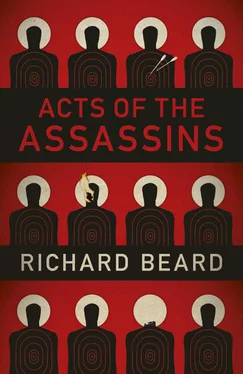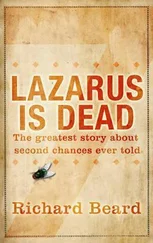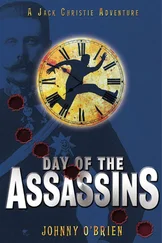‘What about Paul?’
‘You must be joking. If the bodyguard’s clean, it’s two against two.’
‘You don’t believe that. It’s two against one.’
Paul didn’t count as a genuine opponent, not at hand to hand combat.
The lift to the sixth floor opened onto a peach-coloured carpet. Along the corridor a straight-backed chair obstructed the door to Paul’s suite. Baruch lifted it to one side. Gallio placed his thumb over the peephole and rapped on the door. No answer.
‘Paul,’ he kept his voice low, speaking close to the door, thumb down over the peephole as if condemning a gladiator to death. ‘Paul, I have news about Jesus. Open up. Something you should know.’
He rapped again. Nothing. He stood back and let Baruch pull a magnetic keycard from his pocket. The card had a USB lead connected to a flash disc, and Baruch slipped the card into the slot. The light went green and the door clunked open. Gallio worried about Baruch, about his particular skill-set from this point on, so he pushed into the suite ahead of him.
The double bed was undisturbed, and in the bathroom fresh towels were warming on the rail. Paul and his retinue had gone, but Gallio would not be outwitted, not again. He fumbled with his phone, saw another voicemail from Valeria, pressed Call and before she could speak he told her Paul had disappeared from his hotel. He needed CCU backup for an Antioch area locate and lift. Immediately.
‘Slow down,’ Valeria said. ‘I’ve been trying to get hold of you.’
‘He can’t have gone far. He must have been tipped off by someone. He knew we were coming.’
‘Something’s happened,’ Valeria said. ‘In Babylon. You’ll need to change your plans.’
Thomas won’t be needing his rented apartment, not any more. The studio is in a five-storey block made primarily from asbestos, and however much money Thomas had collected he’d spent none of the ‘donations’ on himself.
In the kitchen area his cooker looks unused. In the main living space Baruch turns over the mattress on the single bed, peers behind the TV. He holds up the power lead — the plug has been removed and rewired to a lamp on the bedside table, where there’s a line drawing made on a white paper napkin. Boxes, rectangles. Shapes.
Baruch considers the diagram with his head to one side.
‘Floor plan.’ He points with his finger — ‘kitchen, bathroom.’ With his forefinger he cuts an imaginary window in one of the imaginary walls. ‘Needs more light.’
‘And maybe more actual building.’
Cassius Gallio asks the police chief if Thomas ever invested funds in tangible, real-world construction. The police chief shakes his head. ‘His blueprints existed in the upper air. Illusions, delusions. Never laid a single brick.’
They check behind the curtains, explore the bathroom, but it soon feels as if they’re done. Gallio speculates that someone has been in the flat before them, because no one lives as simply as this. Thomas doesn’t own a phone or a computer, so he can’t have kept in touch with the others, or not from here. He has a wardrobe but no clothes to fill it, and a kitchen cupboard empty of kitchen implements. Gallio would normally sift through Thomas’s possessions, looking for clues, but Thomas has no possessions.
His personality is absent from the Babylon studio, and assuming no one else was here before them, the fieldcraft shown by Thomas is close to perfect. The Jesus disciples were hand-picked and have been impeccably trained in the business, in Cassius Gallio’s business, to make a difference but leave no personal footprint. The flat doesn’t hold out much promise for traces of DNA. Gallio makes a final tour of the sanitised single room, and feels a dull feeling of infinite sadness.
‘How did he settle his rent?’ Baruch like Gallio feels they must be able to learn something here.
‘Cash,’ the police chief says. ‘Promptly on the first of every month. We looked into it.’
‘Pay any taxes?’
‘You’re joking.’
Thomas lived outside the world of telephone books, credit cards, medical insurance, voters’ rolls and utility bills. He didn’t leave forwarding addresses for deliveries, or passport details with money changers.
‘People gave him stuff. Food, his rent money. Probably shoes and clothes too, for free. Hard to believe, but true.’
‘The cash economy, dependent on handouts.’
Baruch is a government employee with a mortgaged house and a pension and at least one adopted family. He lives in the borrow-and-spend economy, never depending on handouts. ‘How do they get away with it?’
‘It’s a strategy,’ Gallio says, ‘all thought through.’ He rubs his finger across the kitchen counter, not a trace of dust. ‘This simple lifestyle, reliant on the will of god and human fellow feeling, is supposed to express a philosophy. It also allowed Thomas to avoid detection until now. That’s not a coincidence.’
Baruch gives Gallio a quizzical look. ‘Everything all right, Cassius? Holding it together?’
‘Never better.’
Gallio’s heart rate is a little fast, and he leans over the counter and makes the ends of his fingers fit together, back and forth, until he gets it right. In Germany and beyond he’d worried about losing his skills as a Speculator, but he can still put a story together that doesn’t involve Jesus as a supreme being.
‘Think of James in Jerusalem,’ he says, straightening up. He can do this. ‘Think of Jude in Beirut. The disciples favour cities, classic fugitive behaviour, and immediately after Judas died they split up and dispersed. They took evasive action and committed to the cash economy. Jesus even picked two men called James. He wanted to confuse, keep us from catching up with them, which he’d need to do if he was alive, making his appearances, telling them what to do. Sometimes maybe pretending to be one of his own disciples.’
‘We should investigate every donor who supported Thomas.’ Baruch hates the idea of the disciples getting something for nothing. ‘You can’t explain his survival in a dog-eat city by kindness. Jesus has to be channelling food and supplies through intermediaries.’
‘The donors check out,’ the police chief says. ‘Mostly the poor, with no obvious connecting factor except a belief system that includes Jesus coming back from the dead. Their motives seem entirely selfish. They helped out Thomas to be rewarded in heaven.’
‘The wife of the deputy finance minister said Thomas didn’t have enemies.’
The police chief laughs at that.
‘Imagine I’m a god,’ he says. ‘I’m going to be thrilled if you tell me I don’t exist. Thomas told the Babylonians their gods were worthless. So excuse me, if I’m the god, and my faithful believers decide to take revenge, as a furious god I reckon I’d give them a hand.’
Baruch looks under the pillow. ‘Who doesn’t exist now, Thomas?’
Gallio keeps his thoughts to himself. There may be a feud within the group of original disciples, and this killing is part of a power struggle. Jesus, presumably, would be on the winning side, and Thomas in the morgue wasn’t an obvious winner. It’s only a theory, Gallio reminds himself. Don’t let the speculation get out of control. The murderer is more likely an outside antagonist.
‘You’re right,’ Gallio says. ‘The disciples are not universally popular.’
He is preoccupied with the thought that if the disciples can live like this, off the grid, then presumably so can Jesus.
Can he? Gallio checks and checks again that he’s making a thoroughly professional deduction — no one found a corpse, so reason dictates that Jesus may be alive. That’s a reasonable conclusion, and one an objective Speculator needs to accommodate. If Jesus survived, by means Cassius Gallio doesn’t presently understand, he can be re-apprehended for significant rewards: an honorary doctorate, lecture tours, hotel room with spa for the visiting keynote speaker. Acclaim, forgiveness, a kind of heaven.
Читать дальше












